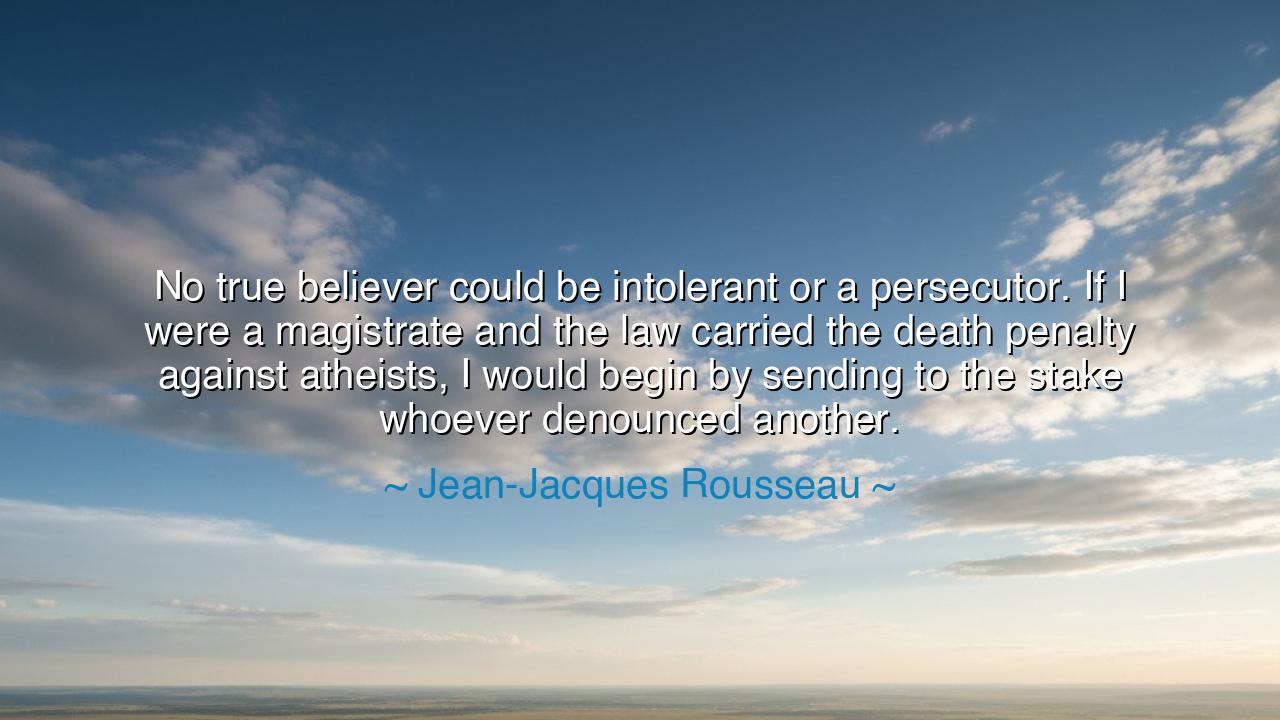
No true believer could be intolerant or a persecutor. If I were a
No true believer could be intolerant or a persecutor. If I were a magistrate and the law carried the death penalty against atheists, I would begin by sending to the stake whoever denounced another.






Jean-Jacques Rousseau once said: “No true believer could be intolerant or a persecutor. If I were a magistrate and the law carried the death penalty against atheists, I would begin by sending to the stake whoever denounced another.” These words burn like fire upon the cold stone of hypocrisy. They were not spoken to flatter kings or to charm the pious multitudes; they were a cry of conscience from one who had seen both faith and fanaticism, and who sought to separate the light of belief from the darkness of tyranny. Rousseau saw that true belief—belief born not from fear, but from love—can never drive a person to hatred. For hatred is the shadow cast by pride, not the fruit of faith.
The true believer, as Rousseau envisioned, does not strike down the unbeliever; he seeks instead to understand him. He does not cry out for the fire of punishment, but for the flame of truth. To persecute in the name of God is to mock the very God one claims to serve. The divine, Rousseau reminds us, has no need of human cruelty to defend it. If the heavens are truly just, what arrogance is it for man to swing the sword in their stead? Thus, Rousseau’s words are not only a defense of the atheist—they are a mirror held to the believer’s soul, asking, “Is your faith strong enough to love those who deny it?”
This truth has echoed through ages of blood and faith. Recall the tragic night of the St. Bartholomew’s Day Massacre in 1572, when Catholics, claiming zeal for God, slaughtered thousands of Huguenots in the streets of Paris. The city ran red with the blood of men, women, and children who differed only in creed. Where, then, was the true believer that night? Certainly not among those who raised their blades in God’s name. True belief would have wept. True belief would have shielded. Rousseau’s words, though written long after, stand as a condemnation of every such act where religion becomes a weapon rather than a refuge.
To understand Rousseau’s meaning is to see that intolerance is not a mark of strength, but of weakness. The one who persecutes reveals his fear—that his faith cannot stand the test of another’s doubt. The man who denounces his neighbor for disbelief betrays the insecurity of his own heart. Rousseau’s irony is sharp: he would execute first the accuser, not the accused, for it is the accuser who corrupts justice, who transforms faith into fanaticism, who makes love of God a license for cruelty. In this way, Rousseau strikes at the roots of tyranny disguised as virtue.
And yet, there is something heroic in his vision of belief. For Rousseau speaks not to destroy religion, but to purify it. He dreams of a faith that lives in harmony with reason and compassion. He imagines a world where men can differ in worship, yet unite in goodness. Such belief is not bound to temples or altars; it dwells in the human heart, where mercy is stronger than dogma. To be a true believer, then, is to walk in humility—to guard not the power of faith, but its gentleness.
Consider the example of the Emperor Ashoka, once a conqueror drenched in blood, who, after the horrors of the Kalinga War, embraced the teachings of compassion and tolerance. He did not persecute those who opposed Buddhism; he honored them. He understood what Rousseau would later teach: that belief, when genuine, cannot be spread by fear, only by example. His reign became one of peace, not because he forced others to believe, but because he learned that the power of faith lies in kindness, not coercion.
Let those who read these words remember: to defend faith by persecution is to destroy it. To love truth is to let it stand freely in the minds of all. Rousseau’s wisdom calls out across centuries, urging us to temper conviction with mercy, and to remember that the heart’s purity matters more than the mouth’s confession. For every time a man is punished for his belief—or his lack thereof—humanity itself is wounded.
So take this lesson, you who would live wisely: Be a believer, not a judge. Be a seeker, not a persecutor. Guard your faith with gentleness, and never let it be the cloak for hatred. When you encounter those who differ from you, do not raise your voice to condemn; raise your spirit to understand. For in that act of compassion lies the truest form of belief—the kind that Rousseau saw shining beyond the smoke of human folly, the kind that no law, no threat, no cruelty can ever extinguish.






AAdministratorAdministrator
Welcome, honored guests. Please leave a comment, we will respond soon